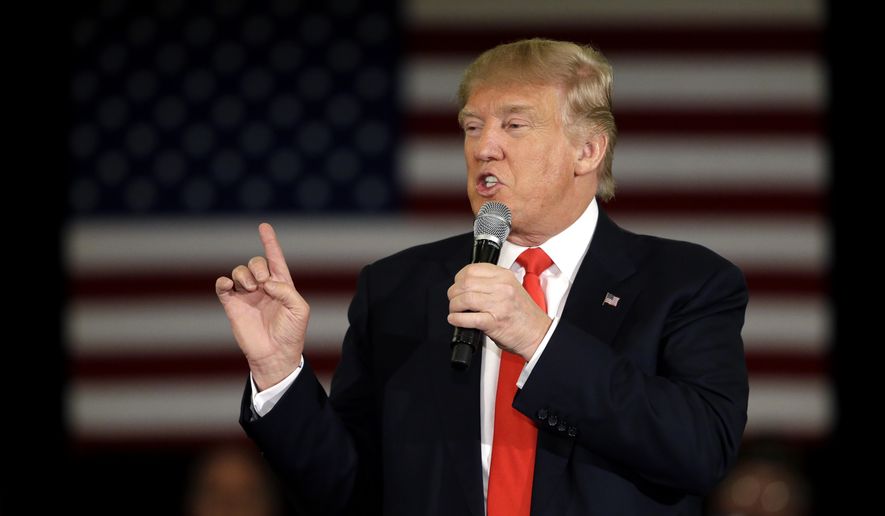The White House went nuclear on Donald Trump Thursday.
While President Obama hosted world leaders at a Washington summit aimed at locking up “loose” nuclear materials, the president’s top advisers slammed the Republican presidential front-runner for engaging in loose talk about using nuclear weapons and encouraging proliferation.
At the summit, White House deputy national security adviser Ben Rhodes said Mr. Trump’s suggestion that South Korea and Japan develop their own nuclear arsenals would have “catastrophic” consequences for U.S. foreign policy.
“It would be catastrophic were the United States to shift its position and indicate that we support somehow the proliferation of nuclear weapons to additional countries,” said Mr. Rhodes, adding that the proposal “flies in the face of decades of bipartisan national security doctrine.”
“Japan and the Republic of Korea benefit from our very rock-solid security assurances that we will come to their defense in any event,” Mr. Rhodes said. “An idea like that is not particularly relevant to the very serious discussions we’re having here.”
Energy Secretary Ernest Moniz, a key figure in the administration’s nuclear deal with Iran, called Mr. Trump’s atomic rhetoric “extremely troubling.”
SEE ALSO: Donald Trump meets with RNC chief Reince Priebus
“It’s a terrible idea, to put it bluntly,” Mr. Moniz said on MSNBC. “We are trying to work to reduce nuclear weapons, their footprint. We certainly in the United States with Russia have made significant cuts in the arsenal. The president has talked about trying to go further, ultimately going to the goal of ideally a … nuclear weapon-free world. I’m afraid this kind of talk in an election is just bluntly irresponsible and is detrimental to our and all of our allies’ security posture.”
In an interview last weekend, Mr. Trump said that asking Japan and South Korea to pay more for their own defense “could mean nuclear.” He said the issue “at some point is something that we have to talk about.”
When asked at a town-hall event this week whether he would ever consider using a nuclear weapon in Europe, Mr. Trump replied, “I am not taking cards off the table.”
Mr. Obama hosted a meeting Thursday with South Korean President Park Geun-hye and Japanese Prime Minister Shinzo Abe, focusing on the threat of North Korea’s nuclear belligerence. He said they are working “to ensure that we have a denuclearized Korean Peninsula and that we can restore a sense of stability and peace to the region.”
Mrs. Park said North Korea’s recent nuclear tests and missile launches create an “urgent” security challenge for all three allies.
Nearby in Washington, Mr. Trump was meeting with his newly created foreign-policy team and paid a surprise visit to the headquarters of the Republican National Committee. His meetings came during a week in which he raised red flags among diplomats and military experts by bemoaning the restrictions of the Geneva Conventions.
“The problem is we have the Geneva Conventions, all sorts of rules and regulations, so the soldiers are afraid to fight,” Mr. Trump said.
Mr. Moniz indicated that administration officials are fielding many inquiries from allies worried about Mr. Trump’s pronouncements on foreign policy.
“We have heard many comments about many statements made in this campaign,” he said.
At the summit, Mr. Obama also met with Chinese President Xi Jinping, their eighth and likely final meeting in which they discussed issues ranging from North Korea to cyber espionage to climate change. The two leaders announced they will sign the Paris climate agreement on April 22, the first day that participating nations are able to do so in the bid to reduce carbon emissions worldwide.
“We’re committing to formally join it as soon as possible this year. And we urge other countries to do the same,” Mr. Obama said.
In the evening, Mr. Obama hosted the world leaders for a working dinner at the White House, where he also met on the sidelines with Turkish President Tayyip Recep Erdogan. Mr. Obama initially wasn’t scheduled to meet with Mr. Erdogan, but Mr. Rhodes said the White House squeezed in a meeting “given the many different complex issues” facing their alliance.
Turkey, a partner in the U.S.-led effort to defeat the Islamic State in Syria and Iraq, has frustrated the administration by battling against local Kurdish troops that the U.S. views as the only ground forces in northern Syria capable of fighting the Islamic State.
During Mr. Erdogan’s visit to Washington, a minor furor also erupted over his bodyguard’s alleged manhandling of a Turkish journalist covering his speech at the Brookings Institute. The National Press Club issued a statement expressing alarm about the incident.
“Turkey’s leader and his security team are guests in the United States,” National Press Club President Thomas Burr said in a statement. “They have no right to lay their hands on reporters or protesters or anyone else for that matter, when the people they were apparently roughing up seemed to be merely doing their jobs or exercising the rights they have in this country. We have increasingly seen disrespect for basic human rights and press freedom in Turkey. Erdogan doesn’t get to export such abuse.”
• Dave Boyer can be reached at dboyer@washingtontimes.com.




Please read our comment policy before commenting.